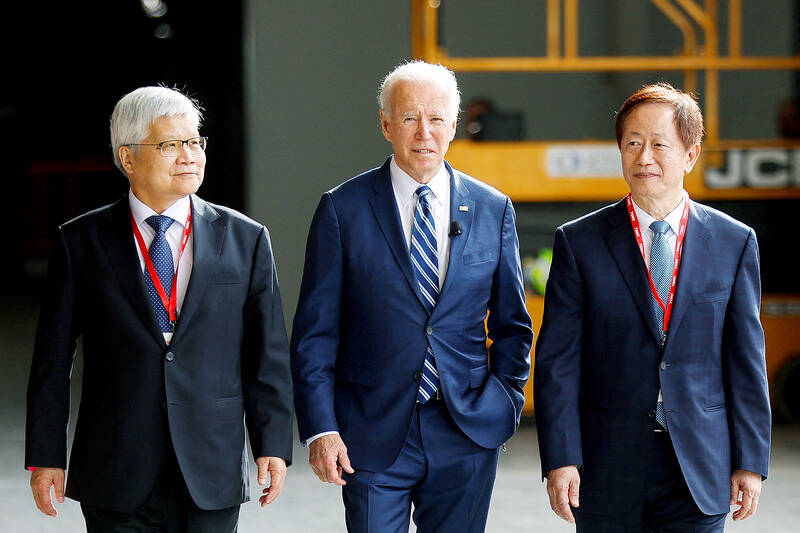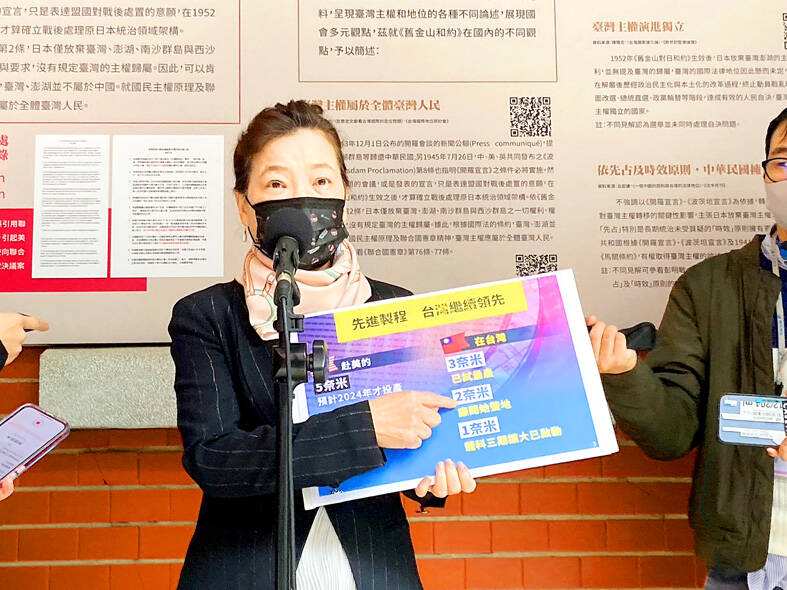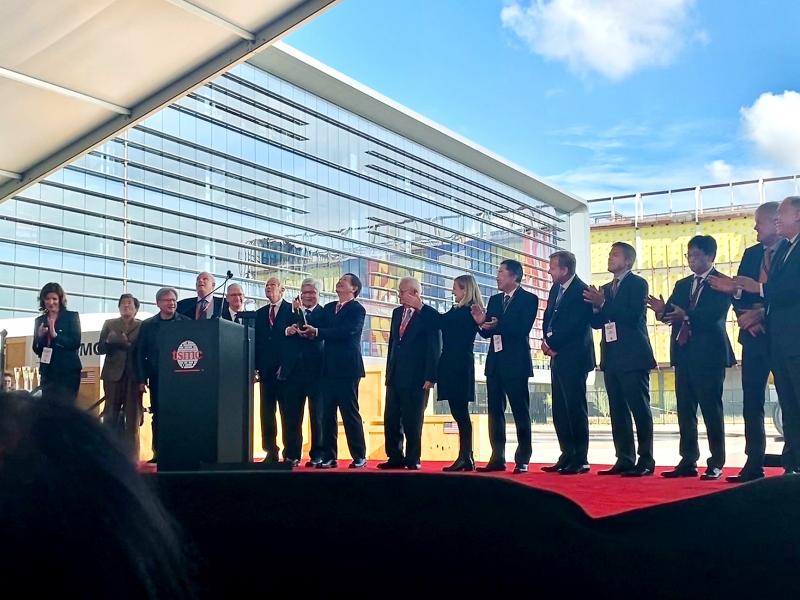"De-Taiwanization” due to Taiwan Semiconductor Manufacturing Co’s (TSMC, 台積電) investments in the US would not happen, Minister of Economic Affairs Wang Mei-hua (王美花) said yesterday, adding that TSMC chief executive officer C.C. Wei (魏哲家) has also emphasized that such a scenario is impossible.
TSMC, the world’s largest contract chipmaker, began construction of a US$12-billion plant in Arizona about 18 months ago with the aim of having it begin commercial production in 2024 using the 5nm process.

Photo: Reuters
However, just hours before United States President Joe Biden’s visit to "First Tool-In" ceremony at the TSMC facility, TSMC announced that it had started the construction of a second fab in Phoenix, Arizona, that will use more advanced 3nm process technology when production begins in 2026.

Photo courtesy of Ministry of Economic Affairs
It also said it intended to make 4nm chips at the first plant instead of 5nm chips as originally planned.
TSMC investment in Arizona could be “a gamechanger,” US President Joe Biden said on Tuesday (US time) during his visit to the site of TSMC’s first chip plant in the state, hailing it as bolstering manufacturing in the US.

Photo courtesy of National Development Council
“TSMC is investing US$40 billion dollars here in Arizona, the largest foreign investment in the history of this state,” Biden said after making a tour of TSMC’s 4-nanometer fab that is still under construction.
In Taipei, some worry that an outflow of talent and technology might lead to the nation’s “de-Taiwanization” with TSMC investing heavily in the US.
“TSMC has a research and development center, and a complete supply chain in Taiwan,” Wang told reporters in Taipei. “The chipmaker’s 3-nanometer fab in Taiwan has started trial production and it is seeking to appropriate land for a planned 2-nanometer fab in places including [Hsinchu County’s] Baoshan Township (寶山) and Taichung.”
“The government is also working on the third expansion phase of the Longtan Science Park (龍潭科學園區) [in Taoyuan] to prepare for TSMC’s 1-nanometer plant,” she said. “With Taiwan’s complete supply chain and ecosystem, coupled with government efforts, Taiwan continues to be TSMC’s most important production base.”
TSMC would also take into account protecting its business secrets, such as technology patents, when investing in the US, she said.
“TSMC is well known globally for its protection of trade secrets,” Wang added.
On Saturday, Wei was asked whether an “outflow of talent” to Arizona might “hollow” Taiwan’s semiconductor industry.
It would not happen, he said.
Taiwan’s semiconductor industry has worked hard to build a solid production and supply chain over the past 30-plus years, so “it is impossible for it to be knocked down,” Wei said.
National Development Council Minister and TSMC board member Kung Ming-hsin (龔明鑫) also dismissed concerns about the loss of key technologies and talent.
Kung, who attended TSMC's tool-in ceremony in the US on Tuesday, said TSMC's planned capacity in the US factories accounts for about 3-4 percent of its total capacity, so there are no such concerns about "de-Taiwanization" at all.
"TSMC will definitely keep the most advanced technology and manufacturing process in Taiwan, and the factories in Taiwan will also be the most profitable ones in the world," he said.
A semiconductor veteran also believes that vast majority of TSMC's advanced process technologies are still in Taiwan and there is no need to exaggerate the issue of these engineers moving from home to overseas as a brain drain problem.
"In fact, it is a good thing," former TSMC vice president in research and development Lin Burn-jeng (林本堅) said in a recent interview with CNA. The 80-year-old Lin now heads the College of Semiconductor Research at the National Tsing Hua University in Hsinchu.
According to Lin, anyone who has the opportunity to work in a foreign country should grab the chance because it helps Taiwanese learn how people overseas think and their way of doing things. "This can help broaden one's working experience," he said.
Additional reporting by Chen Cheng-hui

A magnitude 7.0 earthquake struck off Yilan at 11:05pm yesterday, the Central Weather Administration (CWA) said. The epicenter was located at sea, about 32.3km east of Yilan County Hall, at a depth of 72.8km, CWA data showed There were no immediate reports of damage. The intensity of the quake, which gauges the actual effect of a seismic event, measured 4 in Yilan County area on Taiwan’s seven-tier intensity scale, the data showed. It measured 4 in other parts of eastern, northern and central Taiwan as well as Tainan, and 3 in Kaohsiung and Pingtung County, and 2 in Lienchiang and Penghu counties and 1

FOREIGN INTERFERENCE: Beijing would likely intensify public opinion warfare in next year’s local elections to prevent Lai from getting re-elected, the ‘Yomiuri Shimbun’ said Internal documents from a Chinese artificial intelligence (AI) company indicated that China has been using the technology to intervene in foreign elections, including propaganda targeting Taiwan’s local elections next year and presidential elections in 2028, a Japanese newspaper reported yesterday. The Institute of National Security of Vanderbilt University obtained nearly 400 pages of documents from GoLaxy, a company with ties to the Chinese government, and found evidence that it had apparently deployed sophisticated, AI-driven propaganda campaigns in Hong Kong and Taiwan to shape public opinion, the Yomiuri Shimbun reported. GoLaxy provides insights, situation analysis and public opinion-shaping technology by conducting network surveillance

‘POLITICAL GAME’: DPP lawmakers said the motion would not meet the legislative threshold needed, and accused the KMT and the TPP of trivializing the Constitution The Legislative Yuan yesterday approved a motion to initiate impeachment proceedings against President William Lai (賴清德), saying he had undermined Taiwan’s constitutional order and democracy. The motion was approved 61-50 by lawmakers from the main opposition Chinese Nationalist Party (KMT) and the smaller Taiwan People’s Party (TPP), who together hold a legislative majority. Under the motion, a roll call vote for impeachment would be held on May 19 next year, after various hearings are held and Lai is given the chance to defend himself. The move came after Lai on Monday last week did not promulgate an amendment passed by the legislature that

AFTERMATH: The Taipei City Government said it received 39 minor incident reports including gas leaks, water leaks and outages, and a damaged traffic signal A magnitude 7.0 earthquake struck off Taiwan’s northeastern coast late on Saturday, producing only two major aftershocks as of yesterday noon, the Central Weather Administration (CWA) said. The limited aftershocks contrast with last year’s major earthquake in Hualien County, as Saturday’s earthquake occurred at a greater depth in a subduction zone. Saturday’s earthquake struck at 11:05pm, with its hypocenter about 32.3km east of Yilan County Hall, at a depth of 72.8km. Shaking was felt in 17 administrative regions north of Tainan and in eastern Taiwan, reaching intensity level 4 on Taiwan’s seven-tier seismic scale, the CWA said. In Hualien, the